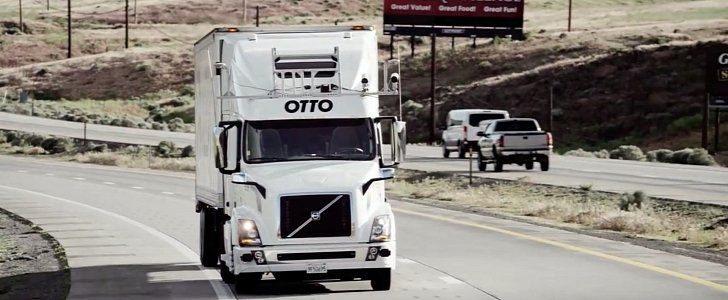For some people, working for the big names of Silicon Valley would be a dream come true. For others, it's a case of "been there, done that, what's next?" That's what a group of people with various backgrounds thought when they founded Otto.
You could say that Otto is yet another company that wants to bring us closer to a driverless future, and you would be right. It seems like everyone connected with either the automotive or the technology industries is working in this direction one way or another, and we believe we know why: it's because they all think they can do it better and quicker than the others.
Up to this point, you can count the brands that have autonomous or semi-autonomous cars on public roads on the fingers of one hand, and their trials have had mixed results. But we're still in the early stages of the development of this technology, and it's still an open race - which is why Otto, just like everybody else, has all the chances of making it. But besides this equality, it's got something more in its favor.
The people who gathered around this latest initiative are some sort of dream team numbering a total of 40. They've got former Google Maps lead Lior Ron and Anthony Levandowski of Google's self-driving car team, plus others from Tesla, Apple, or Cruise Automation. And it's not just the available know-how and hands-on experience of its staff that recommends Otto to be a success, but also its approach.
Instead of going all in from the start, Otto plans to focus on giving large trucks the ability to drive autonomously on the highways first. This makes perfect sense both economically and technologically. Trucks spend most of their lives on the open roads, so a system governing their movements under these circumstances would basically be in control most of the time. The idea of trucks forming large platoons to save fuel by negating their poor natural aerodynamics is also strictly dependent on them becoming autonomous - or, at least, interconnected.
Then there's the fact that Otto has no intention of building its own vehicle. Instead, it plans to offer kits that could be installed on existing vehicles via service shops, or even at the factory, should it succeed in signing agreements with the manufacturers.
Otto is currently entirely self-funded, and it's hell-bent on bringing a product to the market. The company doesn't yet have a price for its autonomous kits, but it will surely be enticing for the people who spend hundreds of thousands of dollars on a truck.
Speaking about the competition, Levandowski told The Verge, "I think the trucking folks are doing a great job, and eventually they would probably solve the problem. But a company that is used to building trucks is not well structured to solve a technology problem. I'm not trying to dismiss them in any way, I think it's fantastic what they're doing. But I think it's a different timeframe and objectives as to what we're trying to solve and what they're trying to solve." We shall see if he's right or not.
Up to this point, you can count the brands that have autonomous or semi-autonomous cars on public roads on the fingers of one hand, and their trials have had mixed results. But we're still in the early stages of the development of this technology, and it's still an open race - which is why Otto, just like everybody else, has all the chances of making it. But besides this equality, it's got something more in its favor.
The people who gathered around this latest initiative are some sort of dream team numbering a total of 40. They've got former Google Maps lead Lior Ron and Anthony Levandowski of Google's self-driving car team, plus others from Tesla, Apple, or Cruise Automation. And it's not just the available know-how and hands-on experience of its staff that recommends Otto to be a success, but also its approach.
Instead of going all in from the start, Otto plans to focus on giving large trucks the ability to drive autonomously on the highways first. This makes perfect sense both economically and technologically. Trucks spend most of their lives on the open roads, so a system governing their movements under these circumstances would basically be in control most of the time. The idea of trucks forming large platoons to save fuel by negating their poor natural aerodynamics is also strictly dependent on them becoming autonomous - or, at least, interconnected.
Then there's the fact that Otto has no intention of building its own vehicle. Instead, it plans to offer kits that could be installed on existing vehicles via service shops, or even at the factory, should it succeed in signing agreements with the manufacturers.
Otto is currently entirely self-funded, and it's hell-bent on bringing a product to the market. The company doesn't yet have a price for its autonomous kits, but it will surely be enticing for the people who spend hundreds of thousands of dollars on a truck.
Speaking about the competition, Levandowski told The Verge, "I think the trucking folks are doing a great job, and eventually they would probably solve the problem. But a company that is used to building trucks is not well structured to solve a technology problem. I'm not trying to dismiss them in any way, I think it's fantastic what they're doing. But I think it's a different timeframe and objectives as to what we're trying to solve and what they're trying to solve." We shall see if he's right or not.


